About This Course and Certification
The Elastic Stack Training Course by Aiuniverse in collaboration with DevOpsSchool.com is an extensive program designed to help IT professionals and organizations gain proficiency in the Elastic Stack (also known as ELK Stack), which consists of Elasticsearch, Logstash, Kibana, and Beats.
This training is crafted to provide a thorough understanding of how to deploy, manage, and scale the Elastic Stack for real-time search, log analysis, and monitoring. The course is led by Rajesh Kumar, an industry-renowned expert in DevOps, cloud technologies, and distributed systems. Upon completing this course, participants will be fully prepared to pass the Elastic Certified Engineer certification, enhancing their credibility and career prospects in search and analytics technologies.
What is Elastic Stack?
The Elastic Stack, commonly referred to as the ELK Stack, is a suite of tools that help organizations collect, search, analyze, and visualize large volumes of data in real-time. It is widely used for log and event data processing, system monitoring, and data search across distributed systems.
The tools in Elastic Stack include:
- Elasticsearch: A distributed, RESTful search and analytics engine. It is the core of the stack and is designed for scalability and high performance.
- Logstash: A server-side data processing pipeline that ingests data from multiple sources, transforms it, and then sends it to a destination (usually Elasticsearch).
- Kibana: A visualization tool used to explore and visualize data stored in Elasticsearch through charts, graphs, and dashboards.
- Beats: Lightweight data shippers that collect and send data from different servers to Logstash or Elasticsearch.
The Elastic Stack is highly flexible and is widely used for:
- Log and event data analytics.
- Full-text search.
- Real-time monitoring of IT infrastructure.
- Business intelligence.
Why Elastic Stack is Important?
Elastic Stack has gained immense popularity due to its versatility, scalability, and real-time capabilities. Here are some reasons why learning Elastic Stack is essential:
- Real-Time Analytics: Elastic Stack allows you to ingest, process, and visualize data in real-time, making it invaluable for monitoring systems, analyzing logs, and extracting insights instantly.
- High Performance and Scalability: Elasticsearch can handle large volumes of data across multiple nodes, making it highly scalable for growing businesses.
- Log and Event Data Management: With data streams flowing from multiple applications, Elastic Stack simplifies the centralization and management of log data, making it easier to troubleshoot and resolve issues faster.
- Visualization and Dashboards: Kibana provides rich data visualization capabilities, enabling users to create powerful dashboards for decision-making.
- Security Analytics: Elastic Stack is often used for security information and event management (SIEM), allowing organizations to detect, investigate, and respond to security threats in real-time.
Whether you are managing a small application or a large distributed system, Elastic Stack enables real-time data analysis and makes the management of complex infrastructures much easier.
Course Features
- Expert Trainer: Learn from Rajesh Kumar, a recognized expert in DevOps and Elastic Stack technologies with over 15 years of experience.
- Hands-On Labs: Practical, real-world exercises to help participants gain hands-on experience with Elasticsearch, Logstash, Kibana, and Beats.
- Certification-Focused: Designed to prepare students for the Elastic Certified Engineer certification exam.
- Interactive Learning: Engaging instructor-led live sessions with Q&A opportunities, group discussions, and real-world case studies.
- Lifetime Access: All participants receive lifetime access to the training materials, including recorded sessions, slides, and assignments.
- Real-World Projects: Participants will work on projects that simulate real-world Elastic Stack use cases.
- Doubt Clearing Sessions: Regular Q&A sessions to resolve participant doubts and clarify concepts.
Training Objectives
The primary goals of this training are:
- Elastic Stack Fundamentals: Understand the core architecture of Elasticsearch, Logstash, Kibana, and Beats.
- Elasticsearch Configuration and Setup: Learn to deploy and configure Elasticsearch clusters, manage indexes, and handle sharding and replication.
- Data Ingestion with Logstash and Beats: Gain expertise in using Logstash and Beats to ingest, process, and transport data to Elasticsearch.
- Data Querying and Analysis: Learn how to query and analyze data stored in Elasticsearch using the powerful Elasticsearch Query DSL (Domain-Specific Language).
- Data Visualization: Use Kibana to create meaningful visualizations, dashboards, and reports for real-time data monitoring and analysis.
- Security and Optimization: Learn how to secure your Elastic Stack setup and optimize performance for large-scale environments.
- Prepare for Certification: Complete preparation for the Elastic Certified Engineer certification exam, with mock tests and sample questions.
Target Audience
This course is ideal for:
- DevOps Engineers: Looking to enhance their expertise in real-time log management and analytics.
- System Administrators: Seeking to centralize and manage logs across multiple systems and infrastructure.
- Data Analysts: Interested in working with Elasticsearch for data search, query, and analysis.
- Software Developers: Who want to incorporate search and analytics functionality into their applications.
- IT Professionals: Looking to implement real-time monitoring, logging, and visualization for their infrastructure.
Prerequisites: Basic knowledge of Linux, networking, and a general understanding of DevOps concepts. No prior experience with Elastic Stack is required, but knowledge of data querying and system monitoring is helpful.
Training Methodology
The training combines a blend of theoretical and practical learning approaches to ensure a deep understanding of Elastic Stack:
- Live Instructor-Led Sessions: Interactive lectures that cover theory, concepts, and best practices.
- Hands-On Labs: Practical exercises where participants will work on real-world scenarios using Elastic Stack tools.
- Real-Time Use Cases: Each session includes a case study that demonstrates how Elastic Stack is used in a real-world environment, such as monitoring logs, analyzing data trends, or managing security events.
- Group Discussions: Collaborative learning environment with Q&A sessions and peer discussions to enhance understanding.
- Assignments: Weekly assignments to help solidify understanding of key concepts.
- Mock Tests: CKA-style practice tests to prepare for certification.
Training Materials
The following materials will be provided to participants:
- Lecture Slides and Presentations: Covering the complete theory of Elastic Stack, including Elasticsearch, Logstash, Kibana, and Beats.
- Lab Guides: Step-by-step instructions to help participants complete hands-on labs.
- Recorded Sessions: Lifetime access to video recordings of all live training sessions.
- Cheat Sheets: Summarized guides for Elasticsearch queries, Kibana dashboards, and Logstash pipelines.
- Practice Exams: Mock exams designed to prepare participants for the Elastic Certified Engineer certification.
- Project Work: Real-world assignments that allow participants to apply what they have learned in practical scenarios.
Evaluation
The effectiveness of the training program will be evaluated based on:
- Pre-Test and Post-Test Assessments: To measure knowledge gained during the training.
- Hands-On Lab Performance: Participants’ ability to complete practical lab exercises and assignments.
- Mock Certification Exam: A final assessment to simulate the experience of taking the Elastic Certified Engineer exam.
- Participant Feedback: Surveys to gather feedback on course content, trainer effectiveness, and overall satisfaction.
Continuing Education
Participants who complete the course will have access to additional resources to further their learning:
- Elastic Official Documentation: Continued access to in-depth documentation on Elastic Stack features and use cases.
- Advanced Elastic Stack Courses: Opportunities to specialize in more advanced areas such as Elastic Stack Security or Elasticsearch Scaling and Performance Optimization.
- Webinars and Community Events: Access to exclusive webinars, conferences, and community events hosted by Aiuniverse and DevOpsSchool.
- Professional Development: Participants will be encouraged to pursue further certifications like Elastic Certified Analyst and Elastic Certified Security Professional.
Certifications Program
Upon completing the course, participants will be prepared to take the Elastic Certified Engineer certification exam, which is offered by Elastic. This certification validates the holder’s expertise in deploying, managing, and scaling the Elastic Stack.
Certification benefits include:
- Recognition as an Elastic expert, highly valued in the IT and DevOps communities.
- Improved job prospects in fields like system administration, DevOps engineering, and data analysis.
- Access to Elastic’s global professional network and exclusive career opportunities.
Level of Training
This training is structured to cater to all levels, from Fundamentals to Advanced, ensuring that both beginners and experienced professionals can benefit from the course. The curriculum starts with an introduction to basic Elastic Stack concepts and moves towards advanced topics such as Elasticsearch optimization, cluster management, and security best practices.
Agenda (Day-Wise)
Day 1:
- Introduction to Elastic Stack and its components: Elasticsearch, Logstash, Kibana, and Beats.
- Understanding distributed architecture and cluster setup in Elasticsearch.
- Installing and configuring Elasticsearch clusters.
Day 2:
- Managing Elasticsearch indices, shards, and replicas.
- Ingesting data with Logstash: Pipelines, filters, and data transformations.
- Using Beats for lightweight data collection from multiple sources.
Day 3:
- Data querying and analysis using Elasticsearch Query DSL.
- Visualizing data in Kibana: Creating dashboards, visualizations, and reports.
- Hands-on lab: Creating real-time dashboards for log analytics.
Day 4:
- Advanced Elasticsearch features: Monitoring, cluster management, and scaling.
- Security in Elastic Stack: Implementing Role-Based Access Control (RBAC), securing data, and encryption.
- Optimizing Elasticsearch for performance and large-scale data management.
Day 5:
- Troubleshooting Elastic Stack: Handling common errors and optimizing performance.
- Preparing for Elastic Certified Engineer certification: Mock exams and hands-on labs.
- Final Q&A session and review of key concepts.
Lab Setup
To participate in the hands-on labs, participants will need the following setup:
- Linux VM (minimum 4 vCPUs and 8GB RAM) or cloud instances (AWS, Azure, or GCP).
- Elasticsearch, Logstash, Kibana, and Beats installed.
- Docker (optional) for deploying Elastic Stack components using containers.
- Basic Linux and networking knowledge to handle installation and configuration tasks.
Detailed setup instructions will be provided before the course begins.
Trainers: Rajesh Kumar
The training is led by Rajesh Kumar, an experienced DevOps and Cloud expert with more than 15 years of experience in helping organizations implement cutting-edge technologies. Rajesh is recognized globally for his deep knowledge of Elastic Stack, Docker, Kubernetes, and CI/CD pipelines. He has trained thousands of professionals and worked with Fortune 500 companies.
For more details, visit www.rajeshkumar.xyz.
FAQs
- What are the prerequisites for this course?
Basic understanding of Linux and networking is recommended. Prior experience with data processing tools is a plus but not required. - Do I need prior knowledge of Elastic Stack?
No, this course covers Elastic Stack from the basics to advanced topics. - Will I get hands-on lab experience?
Yes, this course includes extensive hands-on labs where you will work directly with Elastic Stack components. - What certification will I be prepared for?
You will be prepared for the Elastic Certified Engineer certification. - Will the course material be available after the training?
Yes, you will have lifetime access to all course materials and recorded sessions. - What happens if I miss a session?
All live sessions are recorded, and you will have access to the recordings to catch up. - Is the Elastic Certified Engineer exam included in the course?
No, the certification exam must be scheduled separately with Elastic, but the course thoroughly prepares you for it. - Can I access the course materials on mobile devices?
Yes, all materials and recorded sessions can be accessed on any device. - Are there any group discounts available?
Yes, please contact Aiuniverse for details about group registration discounts. - How long is the Elastic Certified Engineer certification valid?
The certification is valid for 2 years from the date of issue.
Certification
- Certification always plays vital role as it leads you towards a dedicated knowledge and skillsets.
- It provides you the ability to stand out of others.
- It gives you an edge during an interview by impressing the interviewer through your certification.
- DevOpsSchool helps you getting this certificate by making you worth to have it.
- DevOpsSchool gives you a completion certificate after successfully completion your training. it will be as a proof of your ability of knowledge and skills.
- The training will be given by industry recognized expert trainers who will make you an expert professional to hold this certificate.
- This certificate belongs to only DevOpsSchool, not to any other colleges, institute or company.
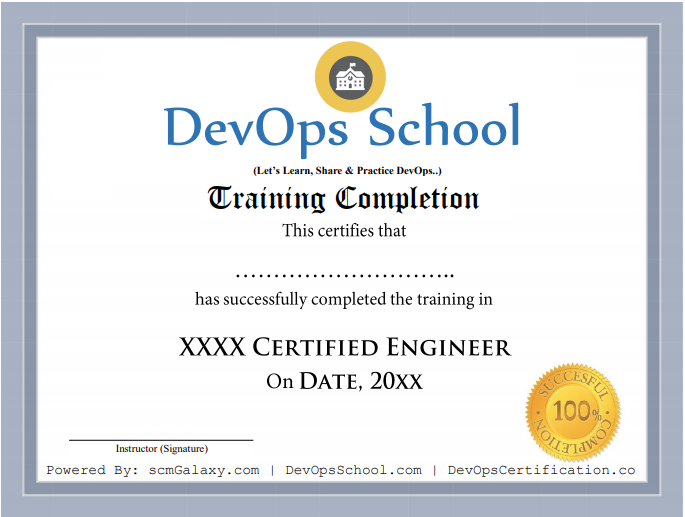
Reviews
By having an excellent journey with 8000+ participants from different countries we have got excellent reviews that helps us stand out of other institutes and being proud. We proudly can say we have helped so many individuals and working professionals to build their career. Here are some of the reviews that we have got from our participants who are happy by being a part of DevOpsSchool.
Videos
Projects
During this training you will get a real-time based project to work on, which will help you to implement your learnings and also it will boost your knowledge and skills. With important tools and platforms you will have real-world experience where we help you to visualize a real development environment, testing environment and production environments.
FAQs
1. Will I get technical support after completion of training?
- Yes, Its free of cost for life time. We will give you can access of our Google drive where you can drop you query and our trainers will respond you back.
2. Why should I learn Elasticsearch course online instead of offline?
- First this is the best option to keep you and your instructor safe in this dangerous pendamic. As well as the environment and benefits what you will get in offline classes same we will provide you in online classes. We will make your experience much better and comfortable than offline classes. That’s why we provide live and instructor-led online classes where you can interact your instructor to clear your doubts.
3. How long will it take to complete the course?
- It will take approx 15 Hrs to fully complete the course.
4. Will I get any placements after the training?
- Well we don’t provide any placements as of now but we can provide you a interview kit to help you out.
5. What are the pre-requisies to learn Elasticsearch?
- No experience required
- Suitable for all types of businesses (digital product, physical product, service, B2B, B2C).
6. Can a non technical person learn Elasticsearch?
- Yes, but it will be very hard to learn because here the technical words and platforms will be used that he will be not aware of so in my recommendation you shouldn’t try but if still if you want to then yoou should be very concentrated and honest with you as you have to work hard.
7. Do you have online classes or offline classes?
- As of now online classes but he it is a group of people requirement then we can have discussion about offline classes.
8. Will I get the job after completing this course?
- Yes, you will be fully capable to perform any task given to you by your domain senior or manager. As you will be certified engineer who will have all the required skills and knowledge to perform any task.
9. Which kind of certification will DevOpsSchool provide?
- It’s a completion certificate. It will show that you have successfully completed the training and have the right skills and knowledge to perform the task assigned by your company.
10. How to start a Elasticsearch career?
- You can go for self learning materials like Pdf, Slides, Youtube videos but there are one more option that is our Elasticsearch program. It’s our Elasticsearch certified program that will teach you from basic to make you able to understand and perform a Prometheus engineer tasks.
11. Who will be my trainer?
- As we have so many trainers its not possible to tell you quickly, as we have to go through their availability. But we can assure you you will get a best trainer as we have a group of best trainers who are very experienced and skillful trainers. They have 15+ IT working experience.
12. Can I get a demo session?
No we don’t provide any demo class but instead of that we can provide you a class recordings so you can decide.
13. Do we have classroom training?
Yes, Classroom training is available in Bangalore, Hyderabad, Chennai and Delhi location. Apart from these cities classroom session can be possible if the number of participants are 6 plus in that specific city.
14. How will I execute the Practicals?
All the Demo/Hands-on are to be executed by our trainers on DevOpsSchool’s AWS cloud. We will provide you the step-wise guide to set up the LAB which will be used for doing the hands-on exercises, assignments, etc. Participants can practice by setting up the instances in AWS FREE tier account or they can use Virtual Machines (VMs) for practicals.
15. What if I miss any class?
In case if you miss the class then there are two ways to get to know what topics has been covered, i.e 1st- We will share the class recordings, notes etc to you and 2nd – you can attend any other session under 3 months of time period.
16. What is course fees?
- Rs 19,999
17. Is Elasticsearch free?
Yes, the free and open features of Elasticsearch are free of cost to use under either SSPL or the Elastic License. As well as free features are available under the Elastic License, and paid subscriptions gives access to support as well as advanced features like, alerting and machine learning.
Our Gallery
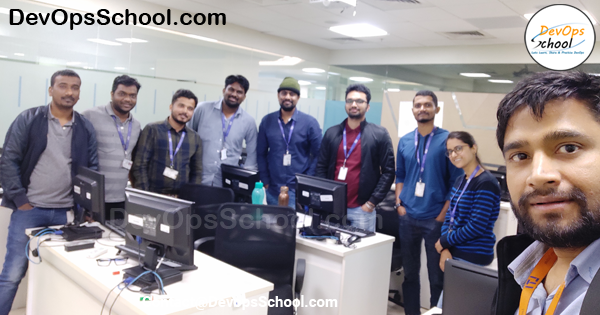
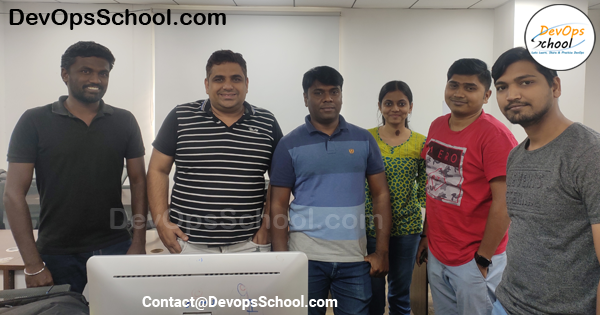
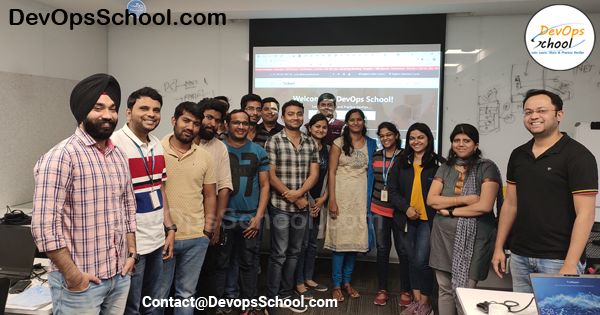
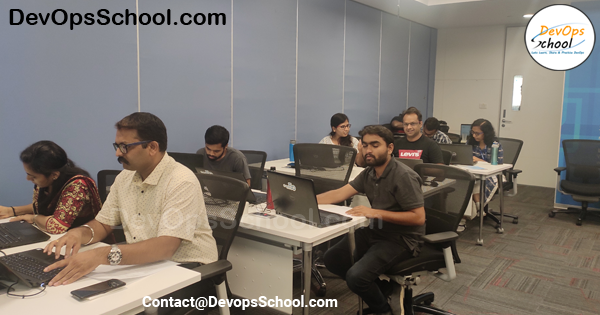
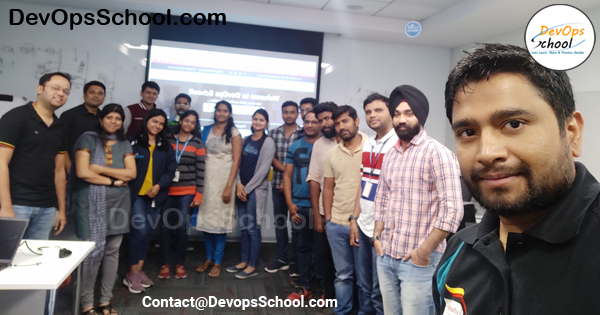
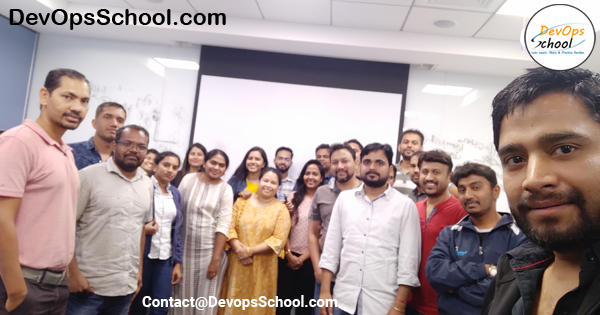
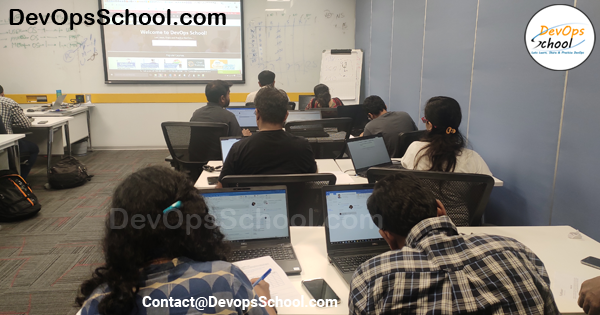
·